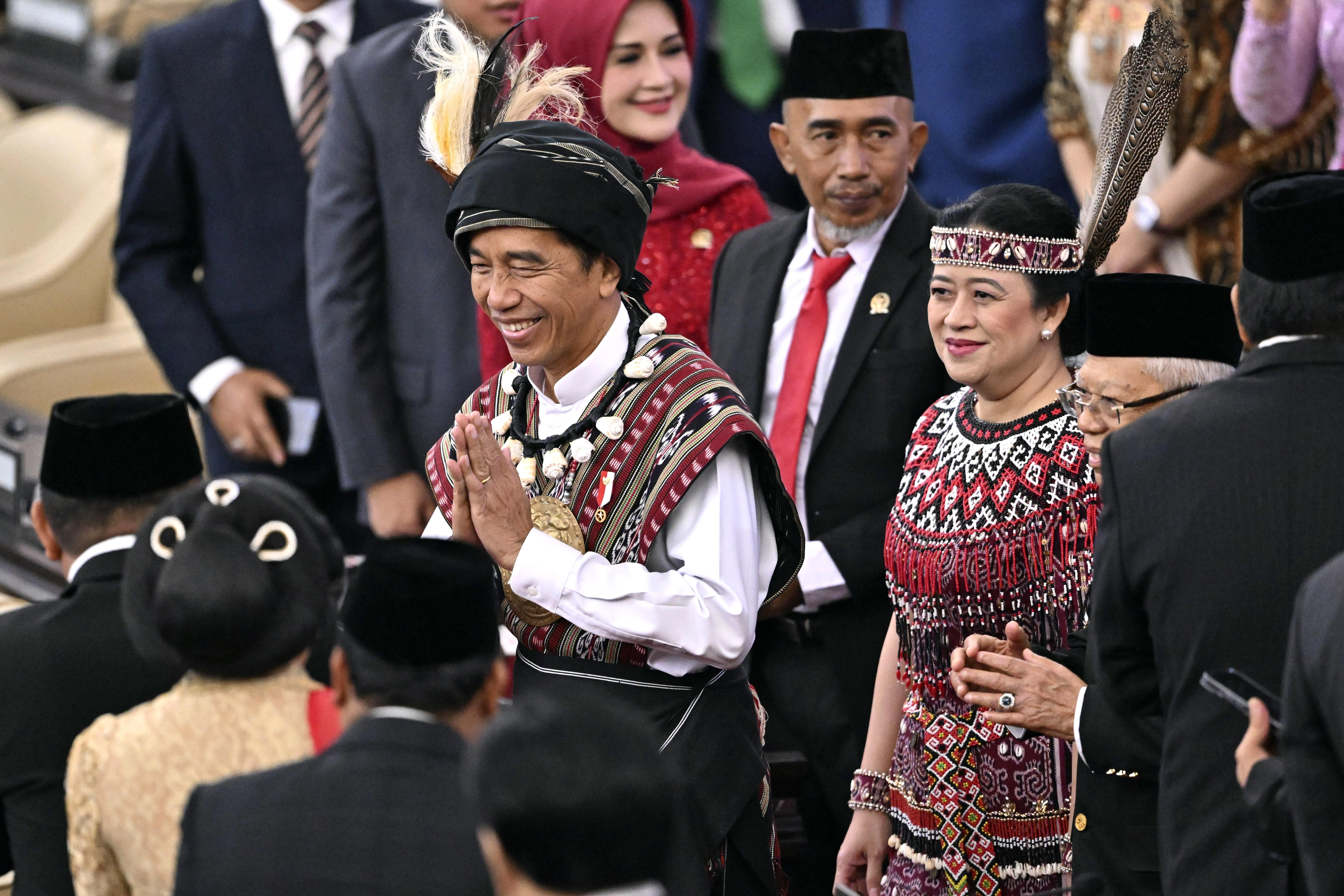Indonesian leader reiterates nation’s aim to join ranks of world’s top economies by 2045
 Indonesian President Joko Widodo (center left), in traditional attire from Tanimbar Islands of Maluku Province, walks with House Speaker Puan Maharani (center right), in traditional outfit from West Kalimantan, upon arrival to deliver his State of the Nation Address ahead of the country's Independence Day, at the parliament in Jakarta, Indonesia, on Wednesday. (PHOTO / AP)
Indonesian President Joko Widodo (center left), in traditional attire from Tanimbar Islands of Maluku Province, walks with House Speaker Puan Maharani (center right), in traditional outfit from West Kalimantan, upon arrival to deliver his State of the Nation Address ahead of the country's Independence Day, at the parliament in Jakarta, Indonesia, on Wednesday. (PHOTO / AP)
Indonesian President Joko Widodo said on Aug 16 that “commodity downstreaming” policy holds the key to realizing Indonesia’s ambitions to become one of the world’s biggest economies by 2045.
In his annual State of the Nation address delivered ahead of Indonesia’s Independence Day, which was marked on Aug 17, Widodo said managing and processing the country’s natural resources and raw materials will support the welfare of the people.
He told members of the People’s Consultative Assembly, the House of Representatives and the Regional Representative Council that “commodity downstreaming”, known locally as “hilirisasi”, will bear “sweet fruits” once the country develops adequate ecosystems for it.
Southeast Asia’s biggest economy is among the world’s biggest commodity exporters. Under the hilirisasi policy, Indonesia is moving toward producing and exporting processed products. This is why the government banned the export of nickel ore and bauxite, while copper ore shipments will not be allowed in 2024.
The country aims to push its GDP per capita to well above $10,000 in a decade and reach $25,000 by 2045, when Indonesia celebrates its centenary of independence.
Widodo said the policy requires the transfer of technology and will not only cover mineral resources but also other commodities like palm oil and coconuts. He said the existing rules, which prohibit export of raw minerals, might harm traders in the short term but this will be offset by long-term gains after the necessary ecosystems have been developed.
The Indonesian leader, in his budget proposal, set the 2024 government revenue target at 2,781.3 trillion rupiah ($182 billion) and spending target at 3,304.1 trillion rupiah, a 2.29 percent deficit. Economic growth for 2024 is targeted at 5.2 percent, and inflation at 2.8 percent.
Widodo said the country’s “demographic bonus” offers another big opportunity. He said Indonesia’s demographic bonus will peak in the 2030s. This is the time when the number of Indonesians aged 15-64, who comprise the working-age population, exceed the number of the nonworking-age population.
Widodo said that rising national productivity will boost international trust in Indonesia, enabling it to attain the goal of “Indonesia Vision 2045”, and become one of the five biggest economies in the world.
Andreas Hugo Pareira, a member of parliament, said the demographic bonus and international trust will help Indonesia to achieve a “Golden Indonesia” in 2045. “We hope this can be achieved because the government already has a strategy for it to happen,” he said.
Widodo said Indonesia has gained global trust, thanks to its successful presidency of the Group of 20 Summit in 2022 and this year’s leadership of the Association of the Southeast Asian Nations (ASEAN) summit; its consistency in promoting human rights and equality; its resilience against a global economic crisis, and the handling of the pandemic.
He said that Indonesia has been able to create room for dialogue, serve as a meeting point, and help bridge differences.
“Our credibility will be more recognized, and our sovereignty will be more respected. Indonesia’s voice will be more listened to, and this makes it easier for us to negotiate,” Widodo said.
Aleksius Jemadu, lecturer in international relations at Indonesia’s Pelita Harapan University, said Widodo is strengthening Indonesia’s economy to serve as a foundation to build international trust.
“This aim can be achieved only if Indonesia opens itself up and increases its competitive strengths through domestic industrial development … although it requires time and policy consistency,” Jemadu said.
Leonardus Jegho is a freelance journalist for China Daily.


